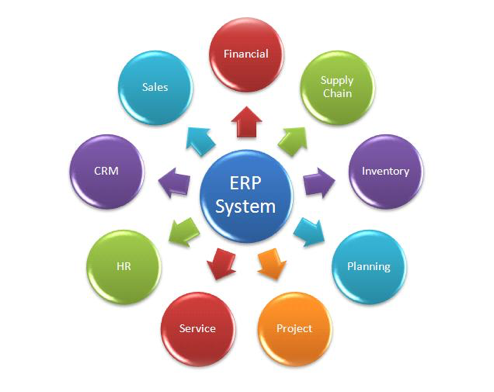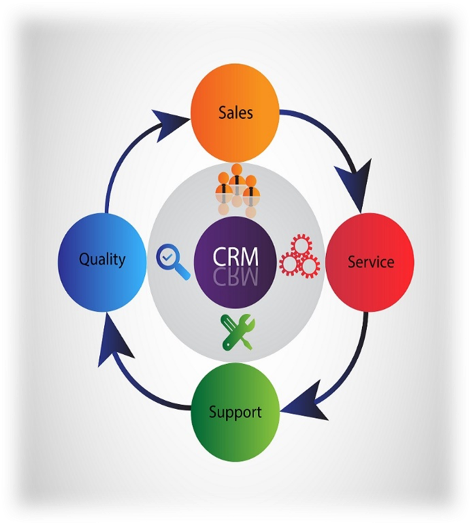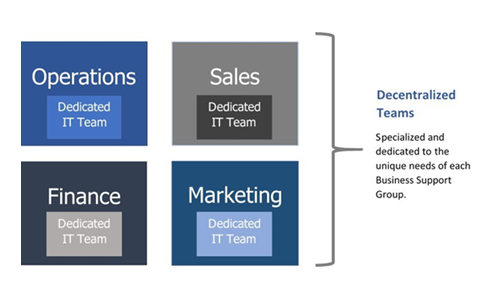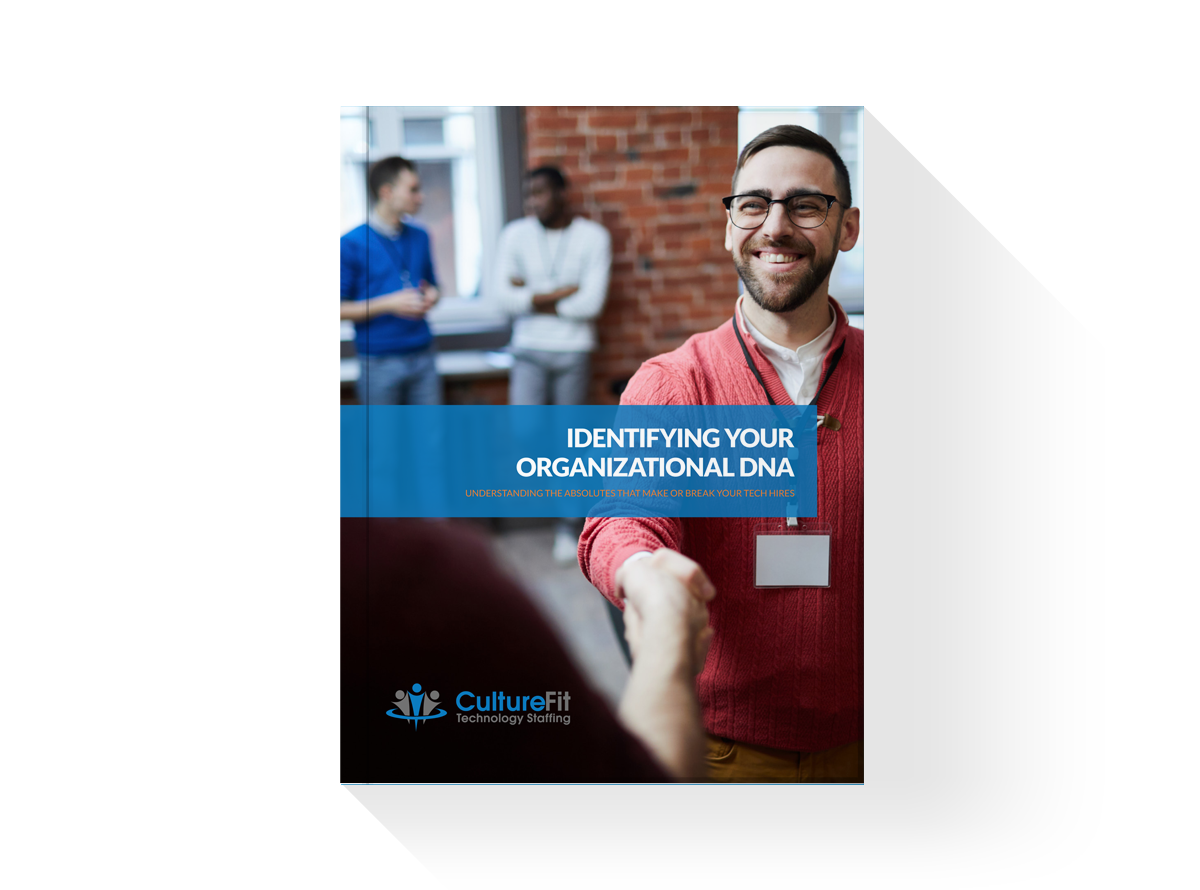Part 3: Decentralized Skill Sets By Line of Business Group
Although, there seems to be no consensus around the best organizational model, centralized vs. decentralized, there seems to be agreement that the trend to decentralize will eventually become main-stream – 64% of IT and Business Leaders agree the decentralized approach actually opens new opportunities for IT professionals; it’s a new way to think about how to shape their skill sets as they specifically apply those skills to a Line of Business(LOB) groups. It dramatically changes the way a professional may want to consider developing their career path. The following outlines 3 LOBs, and how they apply technology from their unique perspectives and goals, along with the types of tech skill sets that are most commonly used to support these goals:
Operations & Finance

This support group is always seeking to leverage technology to gain cost and time efficiencies across an enterprise. Specific technology skill sets for this support can be quite expansive, depending on the size of the company. The following is a quick list of some of the most common areas of focus:
Enterprise Resource Planning (ERP)
One of the most powerful systems used across an enterprise to integrate databases, applications, manage the business and automate back office functions related to technology, services, and human resources. Think of it as a central hub capable of integrating all LOBs.
Technical skill sets typically required: overall this is a project management role leveraging a variety of technology skill sets, such as Infor, Sage, or SAP. Above average communication skills, the ability to cross functional issues that have both macro and micro level business and technical implications, vendor management and negotiation. Frequently the ERP systems will include, but not limited to, the following modules:
- Business Process Management (BPM) Systems
- Enterprise Content Management (ECM)
- Inventory Management
- HR Management
- CRM Database
Sales and Customer Support
These two teams are the front-line communication’s teams with potential and existing customers. They are often the first impression made and establish the brand’s commitment to customer support. When these teams require technical support there’s little to no-time to wait for solutions that are customer impacting. Specializing your tech skills to support this team will also require an agile and adaptive personality – a willingness and ability to respond to “on-demand” environments with a calm demeanor.
Customer Relationship Management (CRM) Systems 
Very few businesses today can operate without a sales CRM. The CRM is a comprehensive database that manages and tracks the progress of all sales activity, a database of all sales assets such as presentations, pre-approved pricing, and standardized terms and conditions. The database also captures and updates critical customer and lead information used for future communication. The CRM is a 360-degree view of all information shared with the customer and/or leads.
Technical skill sets typically required include: SQL database management and an expertise regarding the most commonly used CRMs, such as SalesForce, MS Dynamics, or Oracle/NetSuite – the success of a sales team and management are codependent on the technical skills and expertise to configure, change, report, troubleshoot these complex platforms.
Sales 2.0 Tools
This sales tool box captures an array of applications or all things deemed “sales support”. Typical applications include everything from Wikis. to sales process, to order entry systems that can be quickly updated as new products and pricing changes require updates. It’s a sales support system with one objective, making front line sales people more time efficient with a greater emphasis on the ultimate customer level support. The technical support teams for these tools are sometimes referred to as Sales Enablement Managers.
Technical skill set types: Project management skills are critical as many of these tools require collaboration and specifications which impact multiple business support groups, and the expertise to develop interdepartmental process and technical requirements to manage implementations as seamlessly as possible, with the least amount of operational impact.
Technical Sales Engineer
A unique role for the professional who has both sale’s skill sets along with the experience to create unique, and often complex, customer solutions requiring technical sourcing, specifications, and a clear understanding of the best way scope and implement the solution.
Technical sales engineers are a key point of contact for clients and provide both pre- and after-sales advice. Similar to the Sales 2.0 IT leader, you’ll liaise regularly with other members of the sales team and colleagues from a range of departments, such as:
- design
- development
- production
- purchasing
- quality
- research
- senior company managers.
Marketing
Big Data
Marketing leverages this category to optimize almost all marketing initiatives to gain a higher level of precision and accuracy from both targeting new customer acquisitions, as well as upselling existing customers to generate repeat purchases or a greater transactional value by understanding what other common products are purchased together. Think Amazon, and other digital retailers which provide seemingly instant information for potential customers to consider – “Other products commonly purchased with your selected products.”
Technology skill sets include:
- Data scientists – experts with the right mix of understanding data, coding skills, statistical knowledge and a thorough understanding of the wider business environment and how marketers will use the information to grow profitability.
- NonSQL expertise – an emerging and extremely high demand skill set to acquire marketing data that resides outside a structured environment such as SQL or Access databases.
- Hadoop expertise – including MapReduce, HDFS, YARN, and Spark plays a central role in the development of any big data applications
Responsive Web Design, SEO, Mobile Applications
These 3 marketing categories are table stakes for nearly all businesses, across all industries. The marketing goal is to ensure your company is available and accessible wherever and however customers want to gather information and transact. However, there’s one other critical stakeholder these experts need to consider as an equally high priority – does the site meet Google’s specifications to achieve a high organic ranking.
Technical skills include:
Coders – HTML and CSS coding, Java script (or jQuery), wireframing, basic application development in an object -oriented programming language like Ruby, Python, or PHP,
Google Expertise – a high level of understanding around how to leverage the Google analytics and Google Ad Words platform
Templated Website Platforms – word press and other similar web design applications, with a strong knowledge of features, functionality, available add-ons or plug-ins.
Ultimately, each business needs to determine the best organizational solution to fit the needs of their company from a long-term perspective. CultureFit adapts our recruitment and hiring strategies to align to your unique organizational and staffing needs – identifying candidates that will culturally thrive in the business environment established by the key stakeholders.
CultureFit and Advance Search bring a combination of over 10 years of IT Recruitment; entrusted to hire and place IT professionals throughout the Greater Chicagoland and Milwaukee area. Each year, they’re charged to recruit, negotiate, and place 100’s of open positions with quality talent that meet skill set requirements as well as compliment an organization’s culture. Our unique position has afforded us the opportunity to identify hiring trends from both the organization and the talent’s perspective.


